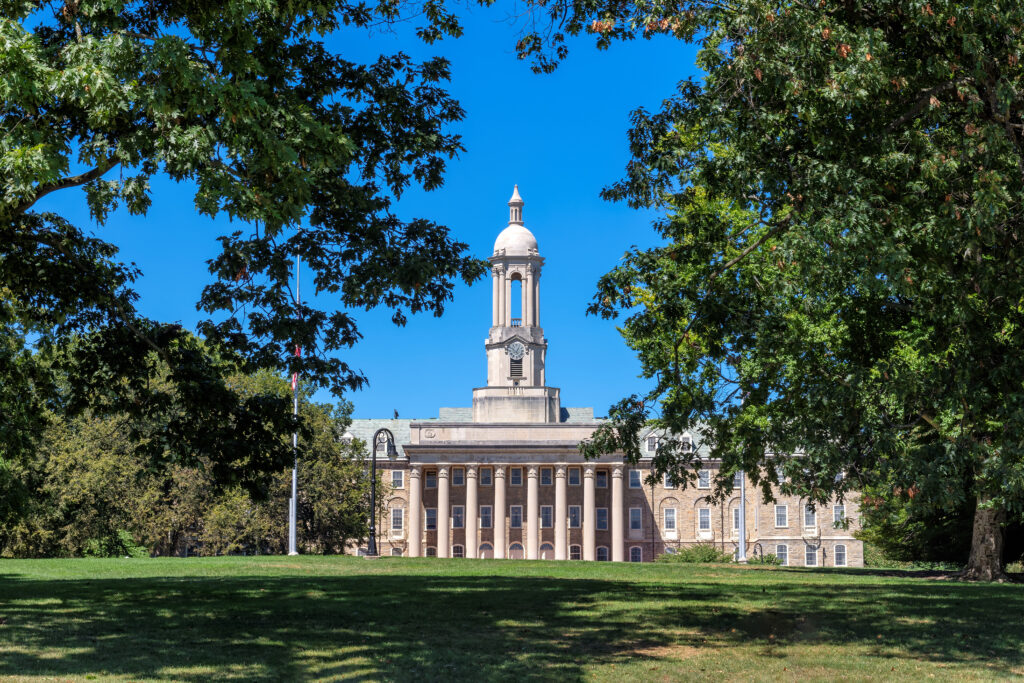The numbers are in: fewer than 1 in 20 students who applied were accepted to the University of Pennsylvania for the Class of 2029. That’s right — in recent years, Penn’s acceptance rate has steadily declined to approximately 5%, continuing a trend among elite institutions that leaves many students and families asking one big question:
Is an Ivy League education still within reach?
But here’s the thing — UPenn isn’t just another selective school. As the birthplace of the Ivy League’s modern, pre-professional model, Penn has earned its reputation as one of the most pragmatic and forward-thinking institutions in the country. Its commitment to academic rigor and real-world readiness sets it apart, even from other top schools in its class.
So what do you need to know? Let’s unpack what the University of Pennsylvania’s latest acceptance rate reveals, why the school is so fiercely competitive, and how ambitious applicants can boost their odds of getting into a college like Penn that you can love.
University of Pennsylvania: Ivy prestige with a modern edge
Founded in 1740 by Benjamin Franklin, the University of Pennsylvania is unique. It combines the rich traditions of traditional Ivy League academia with a pragmatic, pre-professional focus that appeals to the next generation of students. This emphasis on practical learning and interdisciplinary exploration has helped Penn emerge as a bellwether for broader shifts in the college admissions landscape.
Situated in the heart of Philadelphia, the university is home to four undergraduate schools: the College of Arts and Sciences, the School of Engineering and Applied Science, the Wharton School of Business, and the School of Nursing. As an R1 research institution, UPenn is globally renowned for cutting-edge scholarship and innovation. The Wharton School, in particular, has built a global reputation as a leader in finance, business analytics, and management.
And while rankings shouldn’t determine your final choice, it may be persuasive to take a look at the university’s status according to the US News and World Report:
- #1 in Business Schools
- #10 among National Universities overall
- #17 Best Value Schools
Curious to explore UPenn’s unique academic culture for yourself? Check out this campus tour for a peek at the ground level:
UPenn by the numbers: acceptance rate and selectivity trends
In recent years, like many other top universities, the UPenn acceptance rate has followed a sharp downward trajectory. The university declined to share much detailed class data when decisions were officially announced in March of this year, but the student newspaper later reported that the college Class of 2029 (with a record pool of 72,544 applicants) received a 4.9% acceptance rate.
For the Class of 2028, the university reports receiving approximately 65,000 applications and admitting around 2,500, resulting in an acceptance rate of just above 4%. That’s right — only around 5 out of every 100 applicants were admitted.
Let’s take a closer look at the numbers we do have:
| Metric | Class of 2028 |
| Total Applications | 65,000 |
| Students Admitted | ~3,000 |
| Estimated Yield Rate | ~70% |
| Overall Acceptance Rate | ~5% |
| Undergraduate Enrollment | ~10,500 students |
Now, compare that to the last decade, when UPenn’s acceptance rate hovered around 10%. While the school doesn’t officially announce its admissions rate anymore, the student class numbers can’t conceal the broader truth: the competition is real — and intensifying.
What kind of student gets into Penn?
While test scores are now optional, the typical academic profile of a successful Penn applicant is anything but average. Admitted students generally rank at the top of their class and have pursued the most rigorous coursework available to them. For those who submitted scores, SAT middle 50% scores ranged between 1490–1560, and ACTs hovered between 34–35.
But grades and scores are only part of the picture. Penn’s admissions team looks for students who show intellectual curiosity, initiative, and alignment with the university’s collaborative and impact-driven ethos. That could mean launching a nonprofit, conducting original research, or leading a statewide organization — as long as the work is done with purpose, authenticity, and integrity. Admits also tend to express a clear, passionate academic narrative that aligns with one of Penn’s schools, and a strong sense of social impact.

Why is the UPenn acceptance rate so low?
The drop in UPenn’s admit rate isn’t just about prestige or clout. Several structural and cultural trends are colliding to push Ivy League schools, including Penn, toward unprecedented selectivity.
What’s more, UPenn isn’t alone in this trend. Other top schools (like Harvard, Yale, Columbia, and Brown) have all reported single-digit admit rates in recent years — with some dipping below 4%. As application numbers grow and yield rates rise, Ivy League schools are becoming more selective across the board. Let’s discuss why.
Surging applicant pool volume
First and foremost, more students are applying to top-tier colleges than ever before. Online application platforms and broader access to information have made applying easier and more widespread. UPenn alone saw a 34% increase in applications over just five years. That directly translates to more highly-qualified applicants vying for the same number of seats.
Test-optional policies broaden demographics
Like most elite universities, Penn adopted a test-optional policy in response to the COVID-19 pandemic. This decision has opened the door to students who might not have applied in the past due to lower standardized test scores. While this does foster greater access, it also results in larger application pools and, paradoxically, increased competition.
Penn’s pre-professional allure
UPenn has always stood out for its practical, career-oriented approach. The Wharton School alone draws thousands of high-achieving applicants interested in business, entrepreneurship, and finance. Similarly, Penn Engineering attracts future tech innovators eager to combine STEM skills with interdisciplinary learning.
These programs, combined with Penn’s strong placement rates and elite prestige, make it one of the most desirable schools in the country. It seems that this has never been more true than in times of economic stress, when students prioritize job security and steady wages after graduation.
The role of yield management
With yield rates approaching 70%, Penn must be intentional in how many students it admits. Fewer acceptances mean a more precise, curated incoming class — but also a lower acceptance rate overall. Admissions offices now use waitlists more strategically and extend fewer initial offers to prevent over-enrollment.
Taken together, these factors have transformed Penn into one of the most selective and strategically managed universities in the country, where strong numbers alone no longer guarantee admission.
So, what does get you accepted?

How to strengthen your UPenn application
Landing a spot at UPenn is no easy feat, that’s for sure — and there’s no magic formula. But with the right approach, it’s absolutely achievable. Empowerly works with students every year who receive that coveted acceptance letter. Here are some expert-backed strategies to help you put your best foot forward on your Penn application.
Start early and plan strategically.
Building a competitive profile for Penn starts long before senior year. Focus on a strong GPA, take rigorous coursework (including AP or IB classes), and dive deeply into extracurriculars that align with your academic goals. If you’re aiming for an Ivy League-tier school, your academics should be a top priority.
Not sure where to start? Explore our grade-by-grade college prep checklists for freshmen, sophomores, juniors, and seniors, respectively.
If UPenn is your top priority, consider applying early! This doesn’t guarantee admission, but it does demonstrate strong commitment — and offers a statistical edge.
Nail your personal essays.
UPenn’s supplemental essays are a critical part of the application. These prompts give students a chance to demonstrate authentic interest, intellectual curiosity, and alignment with Penn’s culture.
How to hack the process? Avoid generic answers. Instead, be specific about how particular programs, professors, or campus resources match your ambitions. If you get stumped by writer’s block or need help crafting the perfect response, check out our full guide to the UPenn supplemental essays.
Build a balanced college list.
Even top students need a mix of reach, target, and safety schools. UPenn’s low acceptance rate means it’s a “high reach” for even the seemingly-perfect students who apply. Therefore, you should diversify your list to reduce stress and increase options. [Already confused? Check out our primer on the college list.]
Showcase fit and initiative.
Penn values applicants who understand and reflect the university’s mission. Whether it’s through community engagement, research, entrepreneurship, or leadership, make sure your application highlights initiative and impact. Authentic passion always stands out.
What’s more, UPenn isn’t just looking for stellar students — they want future leaders who will thrive in their collaborative, civic-minded, and entrepreneurial ecosystem. Students who succeed here often combine academic passion with real-world engagement: they tutor underserved communities, build apps to address social problems, or lead DEI initiatives in their schools.
In your application, highlight not only what you’ve done but why it matters — and how Penn’s values and resources will help you do even more.
For detailed guidance on Penn-specific strategies, read our comprehensive article: How to Get Into the University of Pennsylvania (UPenn).
Final thoughts: You are more than a number
The University of Pennsylvania’s recent acceptance rates make one thing clear: this Ivy League school is more selective than ever. What’s more, the trend seems to show no signs of stopping.
Competitive applicants to UPenn in this day and age can usually check most or all of these points:
- GPA in the top 5% of their high school class
- Taken the most rigorous courses available
- Led or launched at least one initiative with real impact
- Can clearly articulate why they want to attend UPenn
- Know which UPenn school fits them best
- Built a well-balanced college list, including targets and safeties
- Essays tell a personal, focused, and mission-aligned story
But the good news? You’re not in this alone. If you’re missing a few of these, don’t panic. It’s never too late to refine your strategy. That’s what Empowerly is here for.
Empowerly counselors include former Ivy League admissions officers and highly successful Penn alumni who know exactly what it takes to thrive at this university. From strategic planning to essay editing, we help students craft competitive applications that reflect their strengths and tell their story. Don’t leave your Ivy League dreams to chance. Book a free consultation today and take the first step toward Penn — and beyond.
